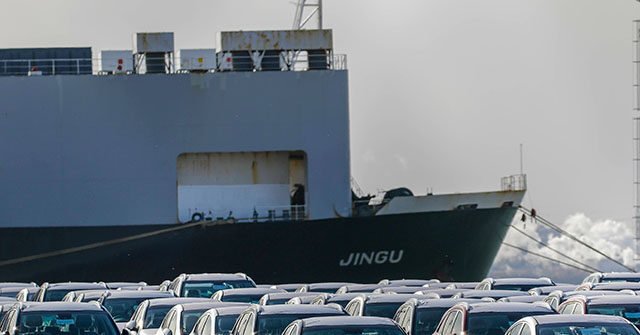Hyundai Motor Company and Kia aim to boost American automobile production to avoid President Donald Trump’s planned 25 percent auto tariff, according to a report.
Trump on Tuesday said the tariff rates on auto imports will be “in the neighborhood of 25 percent,” with more details to come in early April.
He noted that he will give auto manufacturers time to avoid the tariff.
“If they have a plant and factory here, there will be no tariff,” the 47th president remarked.
Both automakers aim to boost domestic production of vehicles by 70 percent with the use of their massive plant in Georgia, which will open in March.
Koo Za-yoong, executive vice president of investor relations at Hyundai, when asked in January about how the company would respond to Trump’s tariffs, said, “It may take some time but our ultimate goal is localizing production to minimize the influence of the tariff threat.”
“If the tariff issue is realized, Hyundai can cover up to 80 percent of U.S. sales with the U.S. production for now, as its Alabama plant has a capacity of 400,000 cars while the Georgia plant will have 350,000 units capacity,” he added.
South Korea’s predominant export is automobiles, comprising 27.2 percent of the country’s total exports, totaling $34.74 billion in 2024.
IBK Economic Research Institute said that, with 25 percent tariffs on foreign automobiles, the country’s auto exports to America would drop to 18.6 percent.
Korea JoongAng Daily reported:
KB Securities also said in a report that if Trump minimizes the rate to 10 percent, Hyundai Motor and Kia will suffer at least a 4.3 trillion won cut in operating profit. By simple calculation, with 25 percent tariffs, that influence could reach some 10 trillion won.
Kia, which even has a manufacturing plant in Mexico, is considering overhauling its supply chain and shipping most of its vehicles to Canada, as the two countries have no tariff system. Trump has previously declared 25 percent tariffs on all products coming from Mexico.
“Hyundai can offer the expansion of U.S. capacity as a bargaining chip on the negotiating table with Trump. But ramping up capacity means more investment. Hyundai has already invested much, and it is Trump’s tall order for it to do more,” Lee Hang-gu, a researcher at consulting firm Automotive Intelligence Networks, said.
“The situation is very severe, even more solemn for GM Korea; almost 90 percent of their production ships to the U.S. market,” he added.
Nissan CEO Makoto Uchida said on February 13 that Trump’s tariffs against Mexico could move automobile production out of the country as well.
“From Mexico to the U.S., we are exporting a significant number of cars this fiscal year […] 320,000 units are exported from Mexico to the U.S., and if the high tariffs are imposed, we need to be ready for this, and maybe we can transfer the production of these models elsewhere if this were the decision, we will think how we can make it a reality while monitoring the situation,” Uchida remarked.
“We are exporting a large volume to U.S., so if there’s a high tariff, this would have huge implications on our business, so we need to monitor this carefully,” Uchida continued.
Sean Moran is a policy reporter for Breitbart News. Follow him on X @SeanMoran3.
Read More: Hyundai, Kia Plan to Boost American Auto Production to Avoid Trump Tariffs


